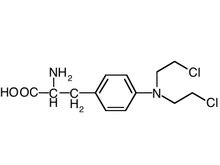An experimental drug combination that inhibits an enzyme that's abundant in tumor cells shows promise against several cancers, new research finds.
Malignant cells produce excess telomerase, an enzyme that may play a role in keeping them alive, says biochemist Calvin B. Harley of Geron Corp. in Menlo Park, Calif. He and other Geron researchers tested the anticancer drug melphalan (marketed as Alkeran) and an anti-telomerase agent on mice with melanoma, a lethal skin cancer.
Injections that combined the two drugs suppressed the cancer better than did just one or the other, Geron's Ning Go reported last month in Anaheim, Calif., at a meeting of the American Association for Cancer Research. At the same meeting, Geron researchers reported that the anti-telomerase drug alone thwarted the growth of precancerous breast cells in test tubes.
Brittney-Shea Herbert, a cell biologist at the firm, says that other research suggests that the anti-telomerase, now designated as GRN163L, might also fight cancers of the prostate, ovaries, and blood.
The Food and Drug Administration this week cleared the drug for testing in people with chronic lymphocytic leukemia, which is diagnosed in roughly 8,200 people each year in the United States.
"GRN163L is on a path to be the first telomerase inhibitor for the treatment of cancer," reports Jerry W. Shay of the University of Texas Southwestern Medical Center in Dallas in the May 1 Cancer Research. The drug "has the potential to be a universal anticancer agent," he says.
Telomerase maintains telomeres, which are caplike structures at the ends of chromosomes. Telomeres normally get shorter with each cell-replication cycle (SN: 5/29/04, p. 349). Once telomeres shrink below a critical length, chromosomes lose their stability, triggering cell death. In cancerous cells, telomerase may keep telomeres from shrinking and instigating this natural self-destruction, Herbert says.
COPYRIGHT 2005 Science Service, Inc.
COPYRIGHT 2005 Gale Group



